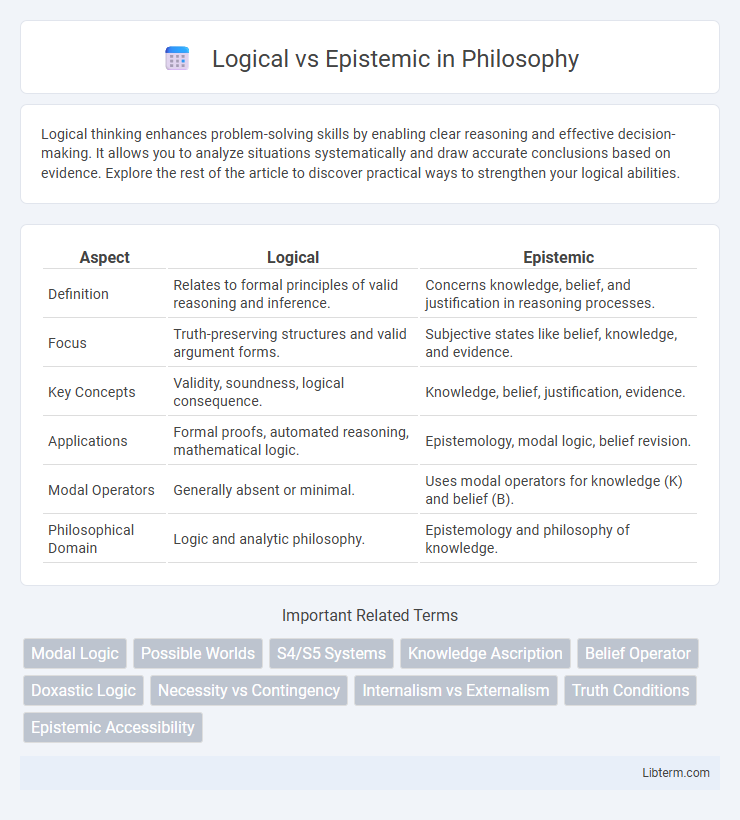Logical thinking enhances problem-solving skills by enabling clear reasoning and effective decision-making. It allows you to analyze situations systematically and draw accurate conclusions based on evidence. Explore the rest of the article to discover practical ways to strengthen your logical abilities.
Table of Comparison
| Aspect | Logical | Epistemic |
|---|---|---|
| Definition | Relates to formal principles of valid reasoning and inference. | Concerns knowledge, belief, and justification in reasoning processes. |
| Focus | Truth-preserving structures and valid argument forms. | Subjective states like belief, knowledge, and evidence. |
| Key Concepts | Validity, soundness, logical consequence. | Knowledge, belief, justification, evidence. |
| Applications | Formal proofs, automated reasoning, mathematical logic. | Epistemology, modal logic, belief revision. |
| Modal Operators | Generally absent or minimal. | Uses modal operators for knowledge (K) and belief (B). |
| Philosophical Domain | Logic and analytic philosophy. | Epistemology and philosophy of knowledge. |
Introduction to Logical and Epistemic Concepts
Logical concepts center on formal reasoning principles, including validity, consistency, and inference rules that structure sound arguments. Epistemic concepts involve the study of knowledge, belief, justification, and the limits of human understanding about truth and evidence. Understanding these foundational distinctions enhances clarity in analyzing arguments and evaluating the basis of knowledge claims.
Defining Logical Reasoning
Logical reasoning involves the process of drawing conclusions based on formal principles and structured rules of inference, ensuring consistency and validity within arguments. It relies on objective criteria such as deductive and inductive logic to evaluate propositions independently of personal beliefs or knowledge states. Logical reasoning forms the foundation of mathematics, computer science, and analytic philosophy by emphasizing clarity, coherence, and systematic proof construction.
Understanding Epistemic Reasoning
Epistemic reasoning involves evaluating knowledge, beliefs, and evidence to determine the validity of information, contrasting with logical reasoning that focuses strictly on formal rules and truth-preserving structures. Understanding epistemic reasoning requires analyzing how agents justify beliefs, update knowledge bases, and handle uncertainty or incomplete information. This approach is essential in fields like artificial intelligence, where decision-making depends on the quality and source of knowledge rather than pure logic alone.
Key Differences Between Logical and Epistemic Approaches
Logical approaches emphasize formal reasoning and the structure of arguments based on validity and soundness, focusing on objective principles derived from symbolic logic. Epistemic approaches concentrate on knowledge acquisition, belief justification, and degrees of certainty, highlighting how agents assess and update their beliefs. The key differences lie in logical methods prioritizing syntactic correctness and inferential validity, while epistemic methods prioritize the evaluation of knowledge claims and rational belief formation.
Applications of Logical Reasoning
Logical reasoning underpins computer algorithms and formal verification by providing structured frameworks to evaluate true or false statements systematically. In artificial intelligence, logical inference enables machines to deduce conclusions from given premises, fueling advancements in expert systems and natural language processing. Epistemic reasoning, while essential for modeling knowledge and belief states, finds practical use in areas like multi-agent systems and game theory, where understanding knowledge dynamics is crucial.
Applications of Epistemic Reasoning
Epistemic reasoning applies to areas such as artificial intelligence, knowledge representation, and multi-agent systems where understanding agents' knowledge and beliefs is crucial. It enables applications in security protocol analysis, allowing systems to infer what participants know or suspect, and in automated planning by modeling uncertainty and information acquisition. Epistemic logic also underpins reasoning about knowledge in distributed computing, optimizing coordination and communication among agents.
Intersections: When Logic Meets Epistemology
Logical and epistemic frameworks intersect in analyzing how knowledge claims are structured and justified using formal reasoning principles. Epistemic logic employs modal operators to represent knowledge and belief states, bridging logical syntax with epistemological concepts. This intersection advances understanding of knowledge dynamics by formalizing how agents acquire, update, and validate information within logical systems.
Common Misconceptions About Logical vs Epistemic Thinking
Logical thinking involves deriving conclusions based on formal rules of inference and structured argumentation, whereas epistemic thinking centers on evaluating knowledge, beliefs, and degrees of certainty. A common misconception is that logical errors always stem from faulty reasoning, ignoring that epistemic flaws like biased information or unjustified assumptions can distort belief formation despite correct logic. Confusing these distinct cognitive processes can lead to overlooking the role of evidence assessment in knowledge acquisition versus the correctness of argument structure.
Evaluating Arguments: A Semantic Perspective
Evaluating arguments from a semantic perspective reveals that logical evaluation centers on the formal validity and structure of reasoning, ensuring that conclusions follow necessarily from premises. Epistemic evaluation emphasizes the justification and knowledge context underpinning the beliefs involved, assessing how well evidence supports the truth of the propositions. This distinction highlights the interplay between truth-preserving logical validity and knowledge-based credibility in argument analysis.
Conclusion: Choosing Between Logical and Epistemic Frameworks
Logical frameworks prioritize formal validity and consistency in reasoning, ensuring conclusions follow strictly from premises through well-defined rules. Epistemic frameworks focus on knowledge states, belief, and justification, emphasizing how information and evidence support conclusions in varying contexts. Choosing between these frameworks depends on whether the goal is to model abstract logical inference or to represent knowledge acquisition and belief dynamics in decision-making processes.
Logical Infographic

 libterm.com
libterm.com